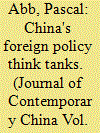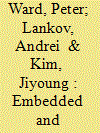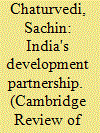|
|
|
Sort Order |
|
|
|
Items / Page
|
|
|
|
|
|
|
| Srl | Item |
| 1 |
ID:
137503


|
|
|
|
|
| Summary/Abstract |
This article provides an overview of activities by Chinese foreign policy think tanks, with a particular focus on developments over the last decade. Covering a sample of prominent institutes, it provides up-to-date information about their academic, advisory and PR functions, and highlights major differences between individual institutes and organizational groups. In line with the findings, I argue that Chinese think tanks have undergone a remarkable increase and professionalization in their academic work, as well as made big strides in improving their footprint in the media. Finally, the article also considers new developments in networking organizations that have been particularly important in bringing experts together to pursue mutual interests, and how these relate to changes in Beijing's international agenda.
|
|
|
|
|
|
|
|
|
|
|
|
|
|
|
|
| 2 |
ID:
179558


|
|
|
|
|
| Summary/Abstract |
North Korea today is a most unusual post-socialist state. Market actors and market prices are integral to economic life, but private property remains illegal, and private enterprise outside the household is de jure non-existent. In such an institutional context, some market processes are more autonomous in relation to the state, while others are more embedded within state structures. In this article, we offer a theoretical account of the shape that North Korea's market economy has taken, developed from a set of fishing industry case studies. We note four broad categories of enterprises: closely embedded, loosely embedded, semi-autonomous, and autonomous. By relative autonomy/embeddedness we mean control over fixed assets, cash flow, and operational decisions such as wage and price setting. We postulate three major determinants of embeddedness/autonomy: (1) relative strategic resource scarcity between state and market actors, (2) monitoring costs, and (3) institutional evolution that reflects these realities, though to varying extents.
|
|
|
|
|
|
|
|
|
|
|
|
|
|
|
|
| 3 |
ID:
118659


|
|
|
|
|
| Publication |
2012.
|
| Summary/Abstract |
This article examines the emerging trends in India's role as a provider of development assistance to the other developing countries of the global South. Though India has diversified the regional focus and has multiplied the quantum of development assistance, there remain several challenges at various levels. The expectations from the development partners have gone up but is India prepared with the institutional frameworks that would be required to administer the desired scale of response? Is there enough preparedness to undertake impact assessment? This article attempts to address some of these issues.
|
|
|
|
|
|
|
|
|
|
|
|
|
|
|
|
|
|
|
|
|